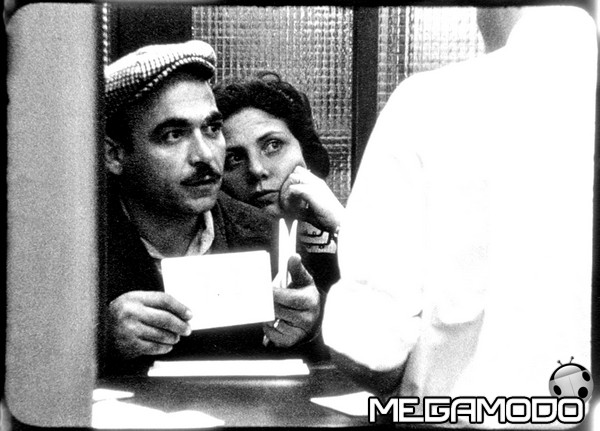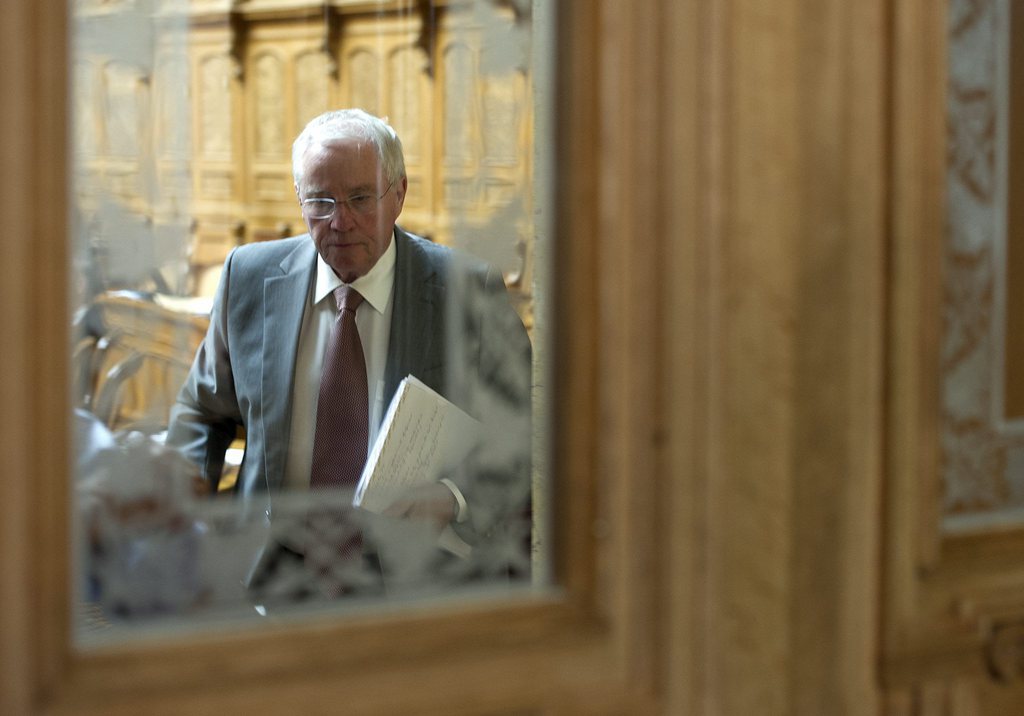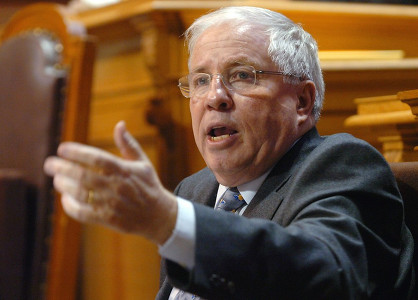Blocher ‘experience’ receives mixed reviews

A highly anticipated documentary about controversial Swiss billionaire Christoph Blocher has premiered at the Locarno Film Festival. It is an intimate look at the country’s most polarising politician, seen by some as a saviour and by others as a threat to democracy.
Whatever you might think of Blocher, there’s no denying the mark he’s made on Swiss politics over the past 20 years. But how do you go about painting a portrait of someone with whom you have fundamental differences?
In L’expérience Blocher, left-leaning director Jean-Stéphane Bron chose to show the career of the pastor’s son who dreamed of becoming a farmer but ended up as a billionaire businessman and one of Switzerland’s most powerful politicians.
He followed Blocher for a year, gaining access to his private life. The result is an intimate portrait, but at the same time a subtle reflection on Switzerland and the wind of nationalism that started blowing through the country in 1992.
Blocher, then president of the rightwing Swiss People’s Party, was the only mainstream politician against Switzerland’s joining the European Economic Area – a halfway house to membership of the European Union. He knew how to win round the majority of voters to his point of view – in the end, 50.3 per cent of Swiss voters said no to joining.
This was his first major political victory and the start of a meteoric rise. Brussels-bashing would remain one of the central themes of his political career.
He would go on to champion Swiss sovereignty and curbs on immigration – arguments that propelled the People’s Party from having 12 per cent of the vote and 25 seats in parliament in 1991 to 29 per cent and 62 seats in 2007, making it the country’s largest political party.
Christoph Blocher was born in October 1940 in Schaffhausen in northern Switzerland.
He made his fortune in the chemical industry with the Ems-Chemie company.
As a member of the rightwing Swiss People’s Party – the strongest in the 2011 parliamentary elections with 26.6% of the vote – he has campaigned against Swiss membership of the European Union and for tighter immigration controls.
He was a member of parliament in the House of Representatives from 1980-2003 and came back again in 2011.
With his election to the multiparty cabinet in 2003, Blocher won a second seat for his party at the expense of the centre-right Christian Democrats.
In 2007, Blocher became only the fourth cabinet minister in Swiss history to fail to win re-election. In 2011, he failed to win election to the Senate.
No surprises
On Tuesday, security concerns prompted festival organisers to deploy extra personnel around the Piazza Grande, but the large and predominantly Swiss crowd – which also had to pass through additional security barriers – was perfectly silent once the film appeared on Europe’s largest outdoor screen.
But anyone expecting surprising revelations would have been disappointed. The film, which was approved by Blocher without any cuts being demanded, is not investigative journalism.
“The idea wasn’t to describe the ‘Blocher system’ but rather the ‘Blocher experience’ – the relationship of a man with his country and with democracy as the main thread,” Bron explained at a news conference.
“Christoph Blocher has been photographed, interviewed and written about thousands of times. I tried to delve into the grey zones which surround him and which doze in the collective subconscious. I therefore limited myself to retracing his past based on known facts. I didn’t want to render him more human but more complex, by stripping him of his aura as a hero.”
The film is shot mainly inside Blocher’s car during the parliamentary election campaign in 2011. Four years after being deselected from the cabinet (see related story), Blocher wanted revenge.
As it turned out, he suffered a personal defeat and the People’s Party lost eight seats – although it still ended up with 26.6 per cent of the vote and remained the largest party.
A few political rivals have their say in the film, and Bron touches on Blocher’s controversial links with apartheid South Africa and his role in the resignation of National Bank chairman Philipp Hildebrand in January 2012. But ultimately Blocher is too much of a media and political animal to let his guard slip, leaving the director just as hungry for scraps as the audience.
Born in Lausanne in 1969, Jean-Stéphane Bron is a graduate of Lausanne’s Cantonal School of Fine and Applied Arts.
After winning several awards in Europe and the USA for Connu de nos services (1997) and La bonne conduite (1999), in 2001 he began shooting Mais im Bundeshuus – le genie helvétique: two years in the making, this film became a box-office hit in Switzerland, attracting some 100,000 viewers and winning the Swiss Film Prize for the best documentary film in 2004.
In 2006, he made his first fiction film, Mon frère se marie, based on his own family story.
2009 saw him found a production company in Lausanne, Bande à part Films, together with filmmakers Ursula Meier, Lionel Baier and Frédéric Mermoud, as well as producers Ruth Waldburger and Robert Boner.
Cleveland Versus Wall Street, his fourth feature-length documentary, was released in 2010: presented at Cannes within the framework of the Directors’ Fortnight, it was also among the nominees for the Cesar Awards. The film won the Swiss Film Prize for Best Documentary Film.
(Source: Swiss Films)
Bron free
Even before L’expérience Blocher was shown in Locarno, various politicians on the left were livid that public money had gone towards a film about a controversial figure who is still politically active. The Federal Culture Office had reportedly contributed CHF260,000 ($278,000), half the film’s budget.
Expectations were high – there had probably never been so many parliamentary correspondents accredited for the Locarno Film Festival.
“It’s an interesting documentary about contemporary Swiss history told through one of the most striking political personalities of the past two decades,” said Markus Häfliger from the Neue Zürcher Zeitung.
“Never before has a film been made like this about a Swiss politician, examining his private life. The star thus becomes a human being, complete with strengths and weaknesses, laughs, disappointments, dark moments. That’s what gave the film its power.”
Bron shadowed Blocher during private moments: visiting the house where he was born, singing an opera aria in his castle, swimming in his pool or struggling with insomnia in his bedroom. His wife Silvia was a discreet presence at his side.
Façade
It’s when it turns to politics that, in Häfliger’s view, the film only scratches the surface and does not fully succeed.
“One of Bron’s aims was to uncover Blocher’s fundamental motivations, but in this sense he struggled to break through his façade. You can’t say this is a political film. You wonder whether this was actually the director’s intention, or whether he had to adapt in some way to the circumstances.”
For his part, Bron said during the news conference that he didn’t carry out any self-censorship and that his choice had been well considered.
The film had the slight taste of an epilogue, possibly because of the dramatic soundtrack and the Citizen Kane-esque image of a solitary man over which “The End” appears. But one thing is certain: the last word has not been said or written about either L’expérience Blocher or its protagonist.
“Never has Blocher been so boring,” was the headline of the review in the tabloid Blick, which said the film soon turned out to be “harmless”.
“Bron deprived the Blochers of their mystique, showing their highs and lows. That might be new for the French-speaking part of the country, but in German-speaking Switzerland the Blocher phenomenon is well-known.”
The Tages-Anzeiger and Bund dailies similarly felt Bron had “succumbed to the Blocher phenomenon in the attempt to show it”. They added that the film “didn’t expose the shadow side of a charismatic person, but rather filmed its effect”.
More positive was Le Temps in Geneva, which said the film “undeniably helps us to better understand Switzerland – and to better live with democracy”.
(Adapted from French by Thomas Stephens)

In compliance with the JTI standards
More: SWI swissinfo.ch certified by the Journalism Trust Initiative













You can find an overview of ongoing debates with our journalists here . Please join us!
If you want to start a conversation about a topic raised in this article or want to report factual errors, email us at english@swissinfo.ch.